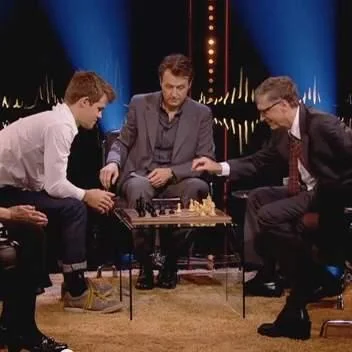Is Bill Gates good at chess? This question has piqued the curiosity of many chess enthusiasts and admirers of the billionaire philanthropist. Bill Gates, the co-founder of Microsoft and one of the world’s wealthiest individuals, is known for his relentless pursuit of knowledge and excellence. In this article, we will explore the extent of his chess skills, the origin of his interest in the game, and the implications of his chess prowess.

A Mind for Strategy
It’s no secret that Bill Gates is an incredibly intelligent individual. The founder of Microsoft has long been associated with strategic thinking and problem-solving, two essential skills in the game of chess. Chess is a game of skill, requiring players to anticipate their opponent’s moves and develop strategies to outwit them. It should come as no surprise that Gates would be drawn to such a mentally stimulating activity.
But is Bill Gates good at chess? The answer to this question may not be as straightforward as one might think. While Gates is undoubtedly intelligent and has a knack for strategic thinking, there is no definitive proof that he is a chess master or even an advanced player. However, his interest in the game and his documented matches against notable opponents do provide some insight into his skills.
The Gates-Carlsen Match
One of the most famous examples of Bill Gates playing chess was his 2014 encounter with Magnus Carlsen, the reigning World Chess Champion at the time. Their lightning match, which lasted just over one minute, ended with Carlsen’s swift victory. Although Gates was defeated, the game did showcase his familiarity with the game’s rules and basic strategy.
It’s essential to note that Carlsen is one of the greatest chess players in history. Losing to him, even in a quick match, should not be seen as an indicator of Gates’ overall chess abilities. Instead, the match offered a glimpse into Gates’ willingness to challenge himself against the best, displaying his competitive spirit and intellectual curiosity.
Learning from the Greats
Gates has been open about his admiration for chess greats like Garry Kasparov and Bobby Fischer. In his 2013 Reddit AMA (Ask Me Anything), Gates mentioned that he had played chess against Kasparov, although the outcome was not specified. Additionally, Gates has cited Fischer’s book, “My 60 Memorable Games,” as an influential read that helped spark his interest in the game.
While there is no concrete evidence to suggest that Gates has reached the level of these chess legends, his willingness to learn from them and immerse himself in the game indicates a strong foundation in chess knowledge and strategy.
The Chess and Business Connection
Is Bill Gates good at chess, and does it matter? The connection between Gates’ chess skills and his success in business and philanthropy is worth considering. In many ways, chess can be viewed as a metaphor for life and business, as it demands strategic thinking, adaptability, and the ability to anticipate future events.
Gates’ chess acumen, while not necessarily at a master level, showcases his strategic mindset and ability to learn from the best. These traits have undoubtedly contributed to his success in building Microsoft and his continued impact as a philanthropist and global influencer.
Bill Gates and the Future of Chess
As a highly influential figure, Bill Gates’ involvement in chess helps bring attention to the game, inspiring new generations to learn and appreciate its intricacies. Gates’ passion for chess and his willingness to play against top-level opponents like Magnus Carlsen can only serve to popularize the game further.
In recent years, chess has experienced a resurgence in popularity, thanks in part to platforms like Twitch and YouTube, where people can watch and learn from skilled players. Gates’ public matches and his discussion of chess in interviews and on social media contribute to this growing interest in the game.
Moreover, as a philanthropist, Gates could potentially use his influence to support chess education initiatives and encourage the development of young chess talent worldwide. By doing so, he could help the game reach even more people and create opportunities for aspiring players to develop their skills and compete on a global stage.
Conclusion
So, is Bill Gates good at chess? While he may not be a grandmaster or elite-level player, there is evidence to suggest that he has a solid understanding of the game and a passion for learning from the best. His encounters with chess legends like Garry Kasparov and Magnus Carlsen demonstrate his competitive spirit and intellectual curiosity.
More importantly, Gates’ involvement in chess brings attention to the game and helps inspire new generations of players. As a strategic thinker and lifelong learner, Gates embodies the spirit of chess, and his interest in the game only serves to further popularize and elevate it in the public eye.
Ultimately, the question of whether Bill Gates is good at chess may be less relevant than the broader implications of his engagement with the game. What truly matters is the impact of his interest in chess on the game’s popularity and the potential for his influence to create new opportunities for aspiring players worldwide.
